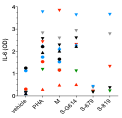Case Study:
Immune Risk Assessment
What was the challenge?
Acquiring critical information on the immunogenic property of a compound prior to clinical trials could be pivotal in avoiding patient risks and attrition due to costly drug failure. The immune system is a very complex system consisting of various innate and adaptive cells of different lineage with different and often overlapping pathways and functions. The possibility of a drug, vaccine, biomaterial, cell or tissue to have immuno-modulatory and immunogenic property is always great. The immune risk assessment is necessary and there are many aspects of testing immunologic risk.

IFNg

TNFa

IL-6
PBMCs of COVID-19-negative volunteers were induced with SARS-CoV-2 antigens in an in vitro human CRA and measured for release of inflammatory cytokines at 24hrs. M protein was a potent inducer.

Cytokine levels in individual PBMCs after stimulation with the M protein. Some donors very high for all cytokines are at risk.
Problem:
Vaccines against SARS-CoV-2 corona virus can be designed using the S protein, and also the entirety containing the M protein. The virus is suspected to cause cytokine storm in some patients. What is the possibility of any of these free proteins released from the vaccine to cause a serious adverse immune response?
Approach:
We took purified full length and peptide forms of the S protein and M protein of SARS-CoV-2 to test in a cytokine release assay (CRA) for the secretion of cytokines associated with cytotoxicity.
Findings:
- The M protein is a very potent inducer of inflammatory cytokines. The S protein and peptides of S region can be immunogenic to some extent.
- Vaccines that may release the M protein can be the cause of cytotoxic immune response in certain individuals. This is a major immune risk of the M protein of SARS-CoV-2.
Added Value:
- Information on signaling pathways related to SARS-CoV-2.

